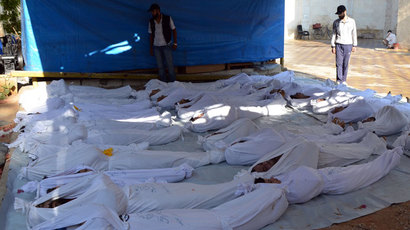German intelligence concludes sarin gas used on Assad’s orders – reports
The German intelligence agency has enough evidence in its possession to conclude President Bashar Assad ordered the suspected chemical attack in Syria, Germany’s Der Spiegel reports, quoting the results of a secret security briefing.
The BND’s President Gerhard Schindler voiced his support for US
allegations Syrian President Bashar al-Assad‘s government ordered
the attack on the eastern Damascus suburb of Ghouta on August 21,
Der Spiegel reported Monday.
The intelligence agency’s chief said that following a thorough
analysis his ministry assumes that the regime is the perpetrator
of the chemical attack which killed hundreds of people.
Schindler reportedly said in the meeting only the Syrian
government were in possession of such agents as sarin. The
agency’s experts concluded it was used in large amounts in the
Ghouta incident resulting in massive fatalities. Sarin is a
neurotoxic gas, high doses of which can lead to paralysis, loss
of consciousness, convulsions, respiratory failure, and
eventually death.
According to Der Spiegel, a reason behind Assad’s decision to deploy the gas was that this was a crucial battle for the capital where the agent might have been meant as a deterrent against rebel forces, but mistakenly the military used too much of it.
In further conclusions, the BND said only Syrian government
experts could mix sarin and place it inside small rockets. The
process reportedly took place several times prior to the alleged
attack which sparked the investigation.
The BND apparently cited new evidence to conclude the agent used
was sarin, having intercepted communications between a high level
Hezbollah official and Iran’s embassy.
In the tapped call, a doctor described details of patient
symptoms specific to exposure to the internationally outlawed
gas.
The German intelligence agency was surprised to hear the
Hezbollah official saying that Assad had snapped, and had made a
big mistake in going through ordering the use of poison gas. The
Lebanese militant group has traditionally been viewed as Assad’s
ally.
Germany is playing a fine balancing act over Syria, RT’s Peter Oliver reported, by “keeping their American allies happy by showing support in that direction, but also by trying to keep the German people happy, as an election is coming up in just a few weeks and opinion inside Germany has been predominantly anti-involvement in the Syrian conflict.”
Germany is trying to clarify its position as the situation goes on. Chancellor Angela Merkel said a few days ago that Germany would only take part in military intervention in Syria with a NATO mandate.
She was planning to talk with Russian President Putin and Chinese President Xi Jinping at the next G20 meeting to find common ground on the Syrian conflict, Merkel said during a TV debate with her political rival Peer Steinbrueck.
"Germany cannot participate in any military intervention without a mandate from the United Nations, NATO or the EU," added Merkel, who is seeking re-election as chancellor for a third consecutive term in late September.
Oliver reported that Germany does not have this “balancing act down to a tee just yet”.
Last week the Foreign Minister issued a statement in English: “Germany will be among those calling for action to be taken.” An hour later it was withdrawn, the Foreign Ministry citing mistranslation.
The ministry came back saying that they would consider consequences perhaps in the future – a far more water downed version.
Also, according to a poll published Thursday, the German public opinion is against military action by the West in Syria, with about 69% opposed to any potential strikes, and only about 23% in favor of military intervention.
Previously, Germany was the first among leading European states that decided not to supply arms to the Syrian opposition.














